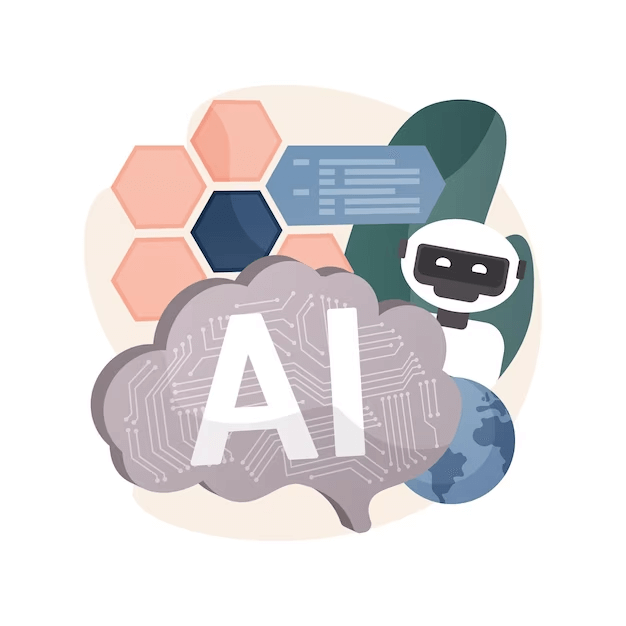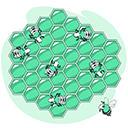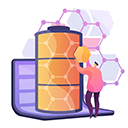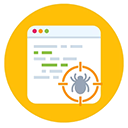HoneyComb is an AI-driven 2D game developed by DiveDeepAI in Unity, utilizing reinforcement learning techniques to train an AI agent that emulates the web-building abilities of a HoneyBee.
Overiew
DiveDeepAI’s HoneyComb mimics HoneyBees’ complex web-building abilities. HoneyComb is a 2D game where an AI agent learns to build webs using Unity, MLAgents, and Barracuda libraries. The project duplicates NASA’s drugged spider experiment to show how marijuana and cocaine affect the Spider’s web-building ability. HoneyComb shows how reinforcement learning can train AI agents and how medicines affect HoneyBees. This innovative experiment could be used in AI and reinforcement learning education, research, and consultancy.

The Problem
HoneyComb tackles several challenges in the realm of AI and reinforcement learning. Here are the key problems this product addresses

Lack of AI and Reinforcement Learning Expertise
Many individuals and businesses lack the AI and reinforcement learning skills to create AI agents that can build websites. This knowledge gap prohibits them from using AI to create intelligent systems and explore innovative applications.

Cost and Resource Intensiveness of Model Training
Reinforcement learning AI model training can be resource-intensive and time-consuming. It demands powerful hardware and large training data. Limited resources may struggle with the prices and technological needs.

Understanding Drug Effects on HoneyBees
Studying the effects of drugs on real HoneyBees in controlled experiments can be ethically and practically challenging.
How does it work
HoneyComb operates through a combination of advanced techniques and technologies to achieve its objectives. By leveraging reinforcement learning, MLAgents integration, and simulating drugged HoneyBee behavior, the project successfully trains an AI agent to emulate the intricate web-building abilities of HoneyBees while exploring the effects of drugs on their behavior. The following sections provide a brief overview of how each component contributes to the functioning of HoneyComb.


The second method involves the integration of MLAgents and Barracuda libraries into the project. MLAgents provides a framework for implementing reinforcement learning algorithms and managing the training process. The library allows for efficient training, data collection, and evaluation of the AI agent’s performance.

The third method focuses on simulating the effects of drugs on the AI agent’s behavior, mimicking NASA’s experiment. Various drugs, such as cocaine and marijuana, are simulated by providing the AI agent with specific inputs or altering its neural network parameters.
The Solution
With a primary focus on emulating the behavior of HoneyBees, HoneyComb provides an AI agent capable of autonomously constructing webs, bringing new possibilities for research, simulation, and educational purposes. Additionally, HoneyComb enables the simulation of drug effects on HoneyBee web construction, replicating NASA’s experiment and shedding light on the impact of substances on behavior. The development of a comprehensive 2D game environment utilizing Unity, MLAgents, and Barracuda libraries creates a powerful platform for training reinforcement learning models, while also providing consulting and custom AI development services to meet the unique needs of clients.

AI Agent For Honeybee Web Construction
The primary solution provided by HoneyComb is the development of an AI agent capable of emulating the behavior of a HoneyBee and constructing a web autonomously. This AI agent can be used for various purposes, such as studying the behavior of HoneyBees, creating realistic simulations, or even as an educational tool.

Simulation Of Drug Effects On Honeybee Web Construction

Training Platform for Reinforcement Learning
The development of the 2D game environment using Unity, MLAgents, and Barracuda libraries offers a comprehensive training platform for reinforcement learning. Researchers and developers can leverage this platform to explore and experiment with reinforcement learning techniques for various applications beyond HoneyBee web construction.

Consulting And Custom AI Development Services
With their expertise in AI, reinforcement learning, and game development, the team behind HoneyComb can provide consulting services to clients interested in AI solutions. They can offer guidance, expertise, and customized AI development services based on specific requirements, helping clients implement AI solutions tailored to their needs.
The Challenges
Training Data Limitations
One of the challenges for HoneyComb is the availability of training data. Since the AI agent is expected to mimic the behavior of a HoneyBee, it requires a substantial amount of data to accurately learn and replicate the web-building process. However, obtaining a diverse and comprehensive dataset that captures various scenarios and environments can be a challenge. Without sufficient training data, the AI agent may struggle to generalize its learning and may not perform optimally in real-world situations.
Incorporating Complex Drug Effects
Simulating the effects of different drugs on the AI agent’s web-building abilities poses a significant challenge. Each drug may have unique impacts on a HoneyBee’s behavior, such as altered motor skills, impaired decision-making, or disrupted coordination. Capturing these effects in the AI agent’s behavior requires in-depth research, accurate modeling, and fine-grained adjustments to the reinforcement learning algorithms. Overcoming this challenge involves carefully studying the effects of each drug and incorporating them into the AI agent’s training process to achieve a realistic and accurate representation of impaired web construction.

Applications

Pollination Optimization
HoneyComb’s AI agent can be utilized to optimize pollination in agriculture. By mimicking the behavior of HoneyBees, the AI agent can autonomously navigate and pollinate crops efficiently, ensuring maximum yield and promoting sustainable farming practices.

Environmental Monitoring
The AI agent developed in HoneyComb can be deployed in environmental monitoring systems. Equipped with sensors, the AI agent can collect data on air quality, temperature, humidity, and other environmental factors. This information can be used for real-time monitoring and analysis, aiding in environmental research and conservation efforts.

Industrial Automation
The AI agent’s ability to learn and adapt to complex tasks makes it suitable for industrial automation. HoneyComb’s AI agent can be trained to operate machinery, perform quality control checks, and optimize manufacturing processes, leading to increased efficiency, reduced costs, and improved product quality.

Search & Rescue Operations
The AI agent’s navigation and decision-making capabilities make it valuable in search and rescue operations. The agent can be trained to navigate challenging terrains, identify and locate individuals in distress, and provide real-time information to aid rescue teams in their efforts.

Smart Home Automation
HoneyComb’s AI agent can be integrated into smart home systems, acting as an intelligent assistant. The agent can learn household routines, optimize energy consumption, and perform tasks such as adjusting lighting, temperature, and security settings based on occupants’ preferences and patterns, enhancing comfort and convenience while promoting energy efficiency.